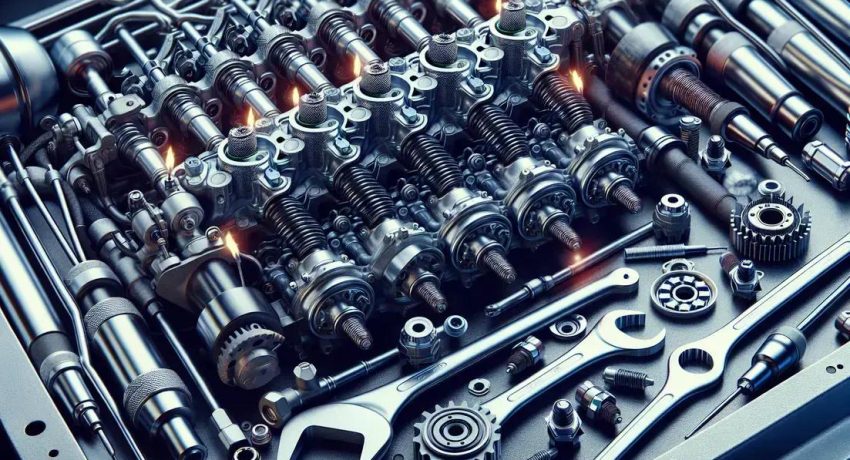When to check engine tuning includes signs like decreased fuel efficiency, strange noises, warning lights, and rough idling, indicating a need for timely maintenance to enhance performance and prolong engine life.
When to check engine tuning can be a game-changer for car performance. Have you noticed a dip in efficiency or strange sounds? It’s worth exploring!
Table of Contents
ToggleSigns your engine is due for a tune-up

If you’re wondering when to check engine tuning, there are several signs that your engine may need a tune-up. Paying attention to these indicators can save you time and money in the long run.
Decrease in Fuel Efficiency
One common sign is a noticeable drop in fuel efficiency. If you’re filling up your tank more frequently without changing your driving habits, it might be time for an engine tune-up.
Strange Noises
Unusual sounds like knocking or pinging can indicate engine problems. These noises often signal that your engine is not running optimally and could benefit from a tune-up.
Dashboard Warning Lights
Pay attention to warning lights on your dashboard. If the check engine light is on, this could suggest that your engine requires immediate attention. Ignoring this signal can lead to more serious issues.
Rough Idling or Stalling
If your engine idles roughly or stalls frequently, it’s a sign that the performance is compromised. This could be due to various issues that a tune-up can address.
Increased Emissions
Higher emissions or a failing emission test is another critical sign that your engine needs a tune-up. If your car is producing more exhaust than usual, it may be time for some maintenance.
Regular engine check-ups not only enhance performance but also extend the life of your vehicle. Keep an eye out for these signs to maintain optimal vehicle health.
Benefits of timely engine tuning

Timely engine tuning offers numerous advantages that can enhance your vehicle’s performance and longevity. Understanding these benefits can help you prioritize regular maintenance.
Improved Fuel Efficiency
One of the most significant benefits of timely engine tuning is improved fuel efficiency. A well-tuned engine runs more smoothly, allowing for better gas mileage, which saves you money at the pump.
Enhanced Engine Performance
Engine tuning optimizes the combustion process, leading to enhanced overall performance. This means your car will accelerate faster and respond better to your driving inputs.
Reduced Emissions
A properly tuned engine emits fewer pollutants, contributing to a cleaner environment. Regular tuning helps ensure your vehicle meets emission standards, which is both beneficial for the planet and necessary for passing inspections.
Extended Engine Life
By addressing minor issues before they become major problems, regular engine tuning can significantly extend the life of your vehicle’s engine. This proactive approach reduces the likelihood of breakdowns and costly repairs.
Better Reliability
Tuning your engine regularly ensures it operates reliably. When all parts are functioning well, you are less likely to experience unexpected issues or failures, giving you peace of mind while driving.
In conclusion, understanding when to check engine tuning is essential for car owners
Recognizing the signs that indicate your engine needs a tune-up can lead to significant improvements in performance and efficiency. Regular maintenance not only enhances fuel efficiency but also reduces emissions and extends the life of your engine.
By staying proactive about engine tuning, you can enjoy a smoother ride, save money on fuel, and minimize repair costs in the long run. Your vehicle will run better, allowing you to travel with confidence.
Don’t wait for issues to arise—make timely engine tuning part of your vehicle maintenance routine today!
FAQ – Frequently Asked Questions about Engine Tuning
How often should I check my engine tuning?
It’s recommended to check your engine tuning every 10,000 to 15,000 miles or as specified in your vehicle’s maintenance schedule.
What are the signs that my engine needs a tune-up?
Common signs include decreased fuel efficiency, strange noises, rough idling, and dashboard warning lights.
Can timely engine tuning improve fuel efficiency?
Yes, regular tuning can optimize combustion and improve fuel efficiency, saving you money on gas.
Is engine tuning necessary for newer vehicles?
Yes, even newer vehicles benefit from regular engine tuning to maintain optimal performance and prevent future issues.
How long does an engine tuning service usually take?
An engine tuning service typically takes 1 to 3 hours, depending on the extent of the work needed.
Will a tune-up fix engine performance issues?
A tune-up can often resolve minor performance issues, but more severe problems may require additional diagnostic work.






